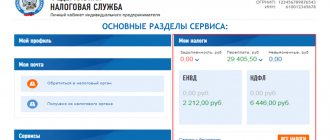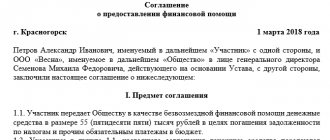In this article we will tell you about the key tools for tax-free (low-tax) transfer of property in business. Each of them has its own characteristics and limitations. Let's understand the nuances with taxCoach experts.
Why might a tax-free transfer of property be required? A change in the ownership of property by concluding a purchase and sale agreement is recognized as a sale and entails the need to pay VAT and income tax (if the general taxation system is applied). If property is transferred within a single group of companies, the occurrence of tax obligations is extremely undesirable: in fact, the property remains the property of the same beneficiary, and taxes must be paid. In addition, a tax-free transfer (change of ownership) of property in a group may be required:
- To increase the level of property security. Obviously, assets that are “vital” to a business should not be located in the operating sector.
- To launch an investment project. It is more logical to start a new promising direction with a clean slate; it should not be subject to the risks and obligations of an existing business. In addition, partners who are not involved in your main business may participate in the implementation of the investment project. In this case, filling the new project with property (including money) should also occur with the most beneficial tax consequences for both the transferring and receiving parties.
- When refinancing in a group: redistribution of financial flows between related companies (entities) also requires the exclusion of unnecessary tax liabilities.
How to make a tax-free transfer of property?
- Capital contribution
- Contributions to property on the basis of subclause 3.7 and subclause 11 of clause 1 of Article 251 of the Tax Code of the Russian Federation, including “daughter gift”
- Reorganization in the form of spin-off
We have recorded the key points for you in a separate table.
| Nuances | Capital contribution | Contribution to property on the basis of subclause 3.7 clause 1 of article 251 of the Tax Code of the Russian Federation | Gratuitous transfer of property on the basis of subclause 11, clause 1, article 251 of the Tax Code of the Russian Federation | Selection procedure |
| Organizational and legal form of the company receiving the property | Any | Only business companies and partnerships | Any one that has an authorized/share capital or fund (JSC, LLC, business partnership/partnership) | Any |
| The size of shares/shares of the transferring party in the authorized capital of the recipient company | Any | Any | 50% or more. Not only direct but also indirect participation is taken into account | Any |
| Does the size of the transferring party’s share in the management company change? | Yes | No | No | No |
| Tax obligations | For organizations on OSN:
| For organizations on OSN:
| For organizations on OSN:
| For organizations on OSN:
|
| What can be conveyed | Cash, securities, other property, property and other rights that have a monetary value. This list should be in the charter | Property, property/non-property rights | Property and property rights. According to the Civil Code of the Russian Federation, non-cash money refers to property rights. From 01/01/2019 to 22/11/2020, their transfer under this item was impossible. | Cash, securities, other property, property and other rights having a monetary value |
| Restrictions | Mandatory independent assessment of non-monetary contributions | Property cannot be transferred to third parties during the year, including under a lease agreement (except for cash) |
Capital contribution
This is the most well-known way of providing a company with property and property rights by its participants. A participant in any commercial organization (JSC, LLC, etc.) can make a contribution to the authorized capital (AC), both at the stage of registration of the company and during its activities.
In addition, a third party can make a contribution to the authorized capital of an LLC upon joining the company’s members. In a joint stock company, a third party can purchase shares during an additional issue, and this will constitute a contribution to the management company. Money, securities, other property or property rights can be contributed to pay for the authorized capital.
Tax consequences
A contribution to the authorized capital of a commercial organization is exempt from income tax (clause 3, clause 1, article 251 of the Tax Code). As for VAT, in a situation where the share in the management company is paid for with property, the transferring party to the OSN is obliged to restore the VAT previously accepted for deduction (clause 3 of Article 170 of the Tax Code of the Russian Federation) in an amount proportional to the residual (book) value without taking into account revaluation (in regarding fixed assets and intangible assets).
However, the receiving party, if it is also on the general taxation system, takes into account the same amount of tax as part of deductions after accepting the property for registration (clause 8 of Article 172, clause 11 of Article 171 of the Tax Code of the Russian Federation). As a result, the balance of VAT amounts paid and accepted for deduction is maintained, which actually means the absence of tax consequences for the business owner of the contribution of property to the authorized capital.
Naturally, if we make a contribution to the capital of a commercial organization under a special tax regime, it will not be possible to take VAT into account as expenses.
Additional expenses
To transfer property to the authorized capital, the law requires an independent monetary assessment of its value (clause 2 of Article 66.2 of the Civil Code).
Risks
The guaranteed amount of liability of a legal entity for its obligations to creditors is equal to the amount of the authorized capital. Also, a large management company can make the company attractive to unscrupulous third parties (for example, raiders).
However, a participant has the right to make a contribution to the management company in an amount exceeding the nominal value of his share. For example, to pay for a share in the authorized capital of an LLC of 10 thousand rubles, a participant may well contribute, for example, 15 million rubles. In this case, the nominal value of his share will be 10,000 rubles. This is exactly what will be indicated in the Unified State Register of Legal Entities. And this contribution (including in terms of the excess of the real amount of the contribution over the nominal value of the share) is not included in the tax base of the receiving party (paragraph 3, paragraph 1, paragraph 3, Article 170, paragraph 11, Article 171, paragraph 8 Article 172 of the Tax Code; paragraph 3, paragraph 1 of Article 251 of the Tax Code).
Tax consequences upon subsequent sale of a share or exit from the company
It is important not only to provide the company with property without taxes, but also to take into account the costs of its acquisition or creation during the further alienation of the share in the company.
In this case, income will arise (from the sale of the share, in the form of the actual value of the share upon leaving the LLC, or in the form of property remaining after liquidation), which can be reduced for tax purposes:
- when selling a share - for expenses associated with its acquisition (for legal entities - clause 2.1, clause 1, article 268 of the Tax Code of the Russian Federation, for individuals - clause 2, clause 2, article 220 of the Tax Code of the Russian Federation);
- upon exit - for the amount of the contribution to the authorized capital (clause 4, clause 1, article 251 of the Tax Code of the Russian Federation for legal entities, clause 2, clause 2, article 220 of the Tax Code of the Russian Federation for individuals);
- upon liquidation - in the amount of the actually paid cost of the share (clause 2 of Article 277 of the Tax Code of the Russian Federation for legal entities, clause 2 of clause 2 of Article 220 of the Tax Code of the Russian Federation for individuals).
If the owner has made a contribution to the company's management company that exceeds the nominal value of his share, the income received upon sale (exit, liquidation) can also be reduced by the amount of expenses for acquiring the share in full. If the payment was in property - for the amount of expenses for acquiring the property.
If you or your organization has continuously owned shares in the company for more than 5 years, then the entire amount of income from the sale of such shares will be:
- be exempt from personal income tax for individuals (clause 17.2, article 217 of the Tax Code of the Russian Federation);
- subject to a tax rate of 0% for income tax for legal entities (Article 284.2 of the Tax Code of the Russian Federation).
THE DONATION OF PROPERTY BY THE COMPANY TO THE FOUNDER IS NOT PROHIBITED BY LAW
Question. The general director is the sole founder of the LLC. Can an LLC transfer household appliances to the director for personal use, if the purchase is not related to the director’s performance of work duties and the equipment was transferred free of charge?
Answer. In accordance with paragraph 1 of Art. 2 of the Civil Code of the Russian Federation, participants in relations regulated by civil legislation are citizens and legal entities.
A citizen acquires, exercises rights and obligations under his own name (Clause 1, Article 19 of the Civil Code of the Russian Federation) and has the right to make any transactions that do not contradict the law and participate in obligations (Article 18 of the Civil Code of the Russian Federation).
A limited liability company, being a legal entity, owns separate property and is liable for its obligations with this property, can acquire and exercise property and personal non-property rights in its own name, bear responsibilities, be a plaintiff and a defendant in court (clause 1 of Art. 48 Civil Code of the Russian Federation). The participants of the LLC are not liable for its obligations and bear the risk of losses associated with the activities of the company, within the value of the contributions made by them, with the exception of cases provided for by the Civil Code of the Russian Federation or the constituent documents of the company (clause 2 of Article 56 of the Civil Code of the Russian Federation, clause 1 of Art. 2 of the Federal Law of February 8, 1998 No. 14-FZ “On Limited Liability Companies”).
Thus, an individual and an LLC, of which this individual is the only participant, act as different and independent participants in civil relations.
According to paragraph 2 of Art. 1 of the Civil Code of the Russian Federation, civil rights can be limited on the basis of federal law and only to the extent necessary in order to protect the foundations of the constitutional system, morality, health, rights and legitimate interests of other persons, ensuring the defense of the country and the security of the state.
In turn, legislation as a general rule does not prohibit the conclusion of transactions between a company and its participants. However, such prohibitions exist for some transactions.
In particular, commercial organizations, to which, by virtue of clause 2 of Art. 50 of the Civil Code of the Russian Federation applies to LLCs, they cannot provide property for free temporary use (clause 1 of Article 689 of the Civil Code of the Russian Federation) to their founders, participants, and managers (clause 2 of Article 690 of the Civil Code of the Russian Federation). Therefore, in the case under consideration, given the gratuitous nature of the transaction, the relationship between the parties cannot be formalized by such an agreement.
At the same time, the gratuitous transfer of LLC property into the ownership of its founder, that is, donation (clause 1 of Article 572 of the Civil Code of the Russian Federation), is not limited or prohibited by law (Articles 575 and 576 of the Civil Code of the Russian Federation). The legality of donations of property by organizations in favor of individuals is confirmed by judicial practice (see, for example, resolutions of the Federal Antimonopoly Service of the West Siberian District dated January 23, 2001 No. F04/152-811/A70-2000, FAS Moscow District dated October 11, 2004 No. KG-A40/9460-04, Federal Antimonopoly Service of the North Caucasus District dated October 17, 2007 No. F08-6775/07, Resolution of the Presidium of the St. Petersburg City Court dated November 1, 2006 No. 44g-582/06).
If the donee is the only participant in the company, while simultaneously performing the functions of its general director, the rules of Art. 45 and 46 of Law No. 14-FZ on the approval of major transactions and interested-party transactions (clause 7 of Article 45 and clause 7 of Article 46 of Law No. 14-FZ).
However, it should be remembered that a contract of donation of movable property worth over 3 thousand rubles, concluded between an organization and an individual, requires its conclusion in simple written form and is void if concluded only orally (Clause 2 of Article 574 of the Civil Code of the Russian Federation).
Thus, in the case under consideration, the LLC has the right to transfer property to its sole founder, who is also the general director of the company, free of charge, however, such a transfer must be formalized by an agreement made in simple written form.
Sergey Shirokov, expert of the Legal Consulting Service "Garant"
Indirect share of participation
Subclause 11, clause 1, Article 251 of the Tax Code of the Russian Federation makes it possible to make a contribution to property not only from a direct participant, but also from a person who has an indirect share of participation through an intermediate company. For a contribution to be exempt from taxation, the share of indirect participation must also be at least 50%.
To calculate the share of indirect participation, it is necessary to multiply the shares of direct participation in each organization along the ownership chain. For example:
In this case, the share of indirect participation of the Participant in Organization No. 3 will be 63%. Accordingly, he can directly, bypassing the intermediate Organization, transfer funds, other property or property rights. When it comes to real estate, this saves time on registration activities and compliance with corporate procedures.
The rules for determining the share of indirect participation are spelled out in detail in clause 3 of Art. 105.2 of the Tax Code of the Russian Federation.
“Children's gift” At the same time, according to paragraphs. 11 clause 1 art. 251 of the Tax Code, not only the parent company can contribute to the property. The opposite situation is possible - the “daughter” transfers the property to the “mother” (the so-called “Daughter’s gift”). And even “grandmother” - taking into account the rules on indirect participation.
The right to use property is a property right
Property includes types of objects of civil rights that are property in accordance with Art. 128 of the Civil Code.
Property rights were expressly excluded from the composition of property.
This clarification was introduced by Federal Law No. 219-FZ of July 20, 2020.
However, this change did not affect non-cash funds and uncertificated securities.
Receiving property for free use should be considered as receiving a property right.
And if no fee is charged for the use of property, then we are talking about obtaining a gratuitous property right.
More on the topic:
Transfer for free use is subject to VAT
Reorganization in the form of spin-off
Reorganization in the form of separation (Article 57 of the Civil Code; clause 8 of Article 50 of the Tax Code of the Russian Federation) is the most universal method of transferring property that does not have organizational and legal restrictions (applicable to both JSC, LLC, and partnerships).
During the spin-off, a second legal entity is formed, which is not the legal successor of the reorganized organization in terms of its tax obligations, except in cases where the tax authority proves that the sole purpose of the spin-off was to evade repayment of debt to the budget (clause 8 of Article 50 of the Tax Code).
Tax consequences
Income tax
A spin-off involves the “spinning off” of an old company into a new company. The property is transferred under a transfer deed and its value is not an expense for the old legal entity and is not income for the new company. That is, there are no income tax consequences.
VAT
The transfer of property within the framework of the allocation is not a sale; the company on the OSN does not have the obligation to charge VAT.
If the legal successor switches to UTII or the simplified tax system, then he is obliged to restore the VAT previously accepted for deduction by the reorganized organization in proportion to the residual (book) value. Clause 3.1 of Article 170 of the Tax Code of the Russian Federation This obligation has been in effect since 2020.
Who can become a participant in the spun-off company?
During the procedure of separation from an LLC, the participants of the new legal entity may become:
- reorganized company;
- participants of the reorganized company in the same composition and in the same proportions;
- part of the participants of the reorganized company (in other proportions) or other third parties.
The main condition is that this third party independently pays for the authorized capital, at least in the minimum amount of 10 thousand rubles.
In the case of a joint stock company, only the first two options are possible during the spin-off. Either the new company becomes a 100% subsidiary of the reorganized company, or the same shareholders in the same proportions become participants in the spun-off company.
In addition, mixed reorganizations in the form of spin-off are allowed, when it is possible to spin off an LLC from a JSC or vice versa.
Risks
The separation must be carried out in strict accordance with the principle of fair distribution of rights and obligations between the old and new legal entity. It means that:
- The assets of the spun-off company must be balanced by liabilities. In other words, it is impossible to transfer fixed assets without transferring the debt on the loans with which these fixed assets were acquired. If the old company has a large amount of accounts payable, then it is fair to transfer to the spun-off company part of such debt associated with the transferred property;
- the spin-off must meet the criteria of the business purpose concept (transfer of part of the assets to organize a new line of activity, business restructuring with the aim of creating several independent business units on the basis of former divisions, etc.).
When separating, the transfer of property and/or obligations to the new organization occurs under a transfer deed.
How to formalize the transfer of goods to the founder for his own needs?
Our company LLC is on the general taxation system.
The sole founder (employee of the organization) needed a product for his own needs. How to formalize the transfer of goods to the founder in this case? In the described situation, the following options are possible:
1. Your organization has the right to pay dividends due to the founder (individual) by transferring property, i.e., in goods.
The company has the right to make a decision quarterly, once every six months or once a year on the distribution of its net profit among the company's participants. The decision to determine the part of the company's profit distributed among the company's participants is made by the general meeting of the company's participants.
Part of the company's profit intended for distribution among its participants is distributed in proportion to their shares in the authorized capital of the company, unless a different procedure is established by the company's charter. The term and procedure for payment of distributed profit are determined by the company's charter or a decision of the general meeting of company participants. The period for payment of part of the distributed profit of the company should not exceed sixty days from the date of the decision on the distribution of profit between the participants of the company (clauses 1-3 of Article 28 of the Federal Law of 02/08/1998 No. 14-FZ).
When dividends are paid in the form of property, the ownership of this property, which previously belonged to your organization, passes to its participants, therefore:
In the accounting of your organization (transferring party)
the above transfer of property is recognized as a sale (Clause 1, Article 39 of the Tax Code of the Russian Federation).
Income from the sale of this property will be included in the income taken into account when determining the tax base for income tax. The transfer of goods to repay debts on dividend payments is subject to VAT. The tax base is defined as the cost of goods, calculated on the basis of market prices (clause 1 of Article 154, clause 1 of clause 1 of Article 146 of the Tax Code of the Russian Federation).
Please note that the transfer of goods to the participant to repay debt on dividends means that the transaction price is equal to the amount of declared dividends (income). It is assumed that this price corresponds to the level of market prices. Otherwise, if the regulatory authorities prove that the actual price of the goods transferred to the founder as payment of dividends differs from the market price by more than 20%, then the tax will be calculated based on the latter.
In accounting, the transfer of goods to the founder on account of dividends due to him is reflected by the entry (Instructions for the use of the chart of accounts for accounting financial and economic activities of organizations, approved by order of the Ministry of Finance of Russia dated October 31, 2000 No. 94n, hereinafter referred to as Instruction No. 94n):
- Debit 84 Credit 70 (75.2)
- reflects the debt to the participant for dividends due (account 70 is used if the founder is an employee of the organization, account 75.2 - if the founder does not work in the organization); - Debit 62 Credit 90.1
– goods were transferred to the founder on account of dividends due; - Debit 90.02 Credit 41
– the cost of the transferred goods is written off; - Debit 90.03 Credit 68
– VAT is charged on the transferred goods; - Debit 70 (75.2) Credit 62
– reflects the offset of the transferred goods against dividends.
From the founder (host)
:
When paying income in the form of dividends to an individual, your organization is recognized as a tax agent. The organization calculates personal income tax on the amount of accrued dividends (paid in kind), calculated according to the formula given in paragraph 5 of Article 275 of the Tax Code of the Russian Federation. The tax rate on income in the form of dividends is set at 9% (clause 1, clause 1, article 208, clause 1, article 209, clause 1, article 211, clause 2, article 214, clause 4, article 224 Tax Code of the Russian Federation).
The amount of tax on income in the form of dividends subject to withholding at the source of payment is reflected by the entry: Debit 75.2 Credit 68.
If the founder is an employee of the organization, then personal income tax on dividends can be withheld by the organization when paying him the next salary. In this case, the amount of personal income tax withheld from the founder will be reflected in the accounting of your organization by the posting: Debit 70 Credit 68.
For more information about calculating personal income tax on dividends in 1C:Enterprise, read the reference book “Personnel records and settlements with personnel in 1C programs” in the “Personnel and remuneration” section in the 1C:ITS information system
2. Free transfer of goods from your organization to an individual (founder).
In this case , in the accounting of your organization (transferring party)
:
- When transferring goods free of charge, its value is written off as other expenses. In this case, an entry is made to the debit of subaccount 91.02 and the credit of account 41 (clause 11 of PBU 10/99 “Organizational expenses”, approved by order of the Ministry of Finance of Russia dated 05/06/1999 No. 33n, Instruction No. 94n);
- for the purpose of calculating profit tax, the value of gratuitously transferred property and expenses associated with such transfer are not taken into account for profit tax purposes (clause 16 of Article 270 of the Tax Code of the Russian Federation);
- For the purposes of calculating VAT, the gratuitous transfer of goods is a sale and is subject to VAT. The amount of VAT is reflected in the accounting record: Debit 91.02 Credit 68 (clause 11 PBU 10/99 “Organizational expenses”, approved by order of the Ministry of Finance of Russia dated 05/06/1999 No. 33n, clause 1 clause 1 article 146 of the Tax Code of the Russian Federation, Instruction No. 94n).
Please note that if goods are received free of charge by an individual who is not registered as an individual entrepreneur, then your organization transferring the goods is a tax agent for personal income tax.
From the founder (host)
:
The market value of goods transferred free of charge is included in the tax base for calculating personal income tax as income received in kind (clause 1 of Article 211 of the Tax Code of the Russian Federation). The personal income tax rate for such income is 13%.
In the 1C:ITS information system you can get even more information:
- on the calculation of VAT upon gratuitous transfer and on its reflection in “1C:Enterprise” - in the directory “Accounting for Value Added Tax” in the “Accounting and Tax Accounting” section;
- about expenses that do not reduce the tax base for income tax - in the directory “Organizational Income Tax” in the “Taxes and Contributions” section.
3. Any fact of transfer of goods into the ownership of another person (free of charge or as dividends) is documented, as a general rule, with shipping documents (waybill, waybill), drawn up in accordance with the requirements of the current legislation of the Russian Federation.
The 1C:ITS information system is updated every day and contains ready-made advice on accounting, tax and personnel records. It is quite possible that the answers to the specific practical questions that you are currently looking for are already in the “Auditor Answers” section of the 1C:ITS Information System. And in order not to miss the latest expert advice and other useful information, you can subscribe to the free newsletter: https://its.1c.ru/news/subscription.php
You can enter into an information technology support agreement with a recommended partner
More about 1C:ITS
Selection with appendix
Within the framework of one reorganization, the law allows you to combine two procedures at once (Article 57 of the Civil Code of the Russian Federation): separation and merger, which can significantly save time and costs for reorganization. First there is separation, then attachment. The intermediate company resulting from the spin-off is virtual in nature, as it is used solely to transfer assets and liabilities to the acquiring company. The period of existence of this legal entity is not defined by law, but we can say that it tends to zero.
Documents are drawn up first for the separation of the company. According to the transfer deed, part of the assets and liabilities of the reorganized company is transferred to it, which are then added to the balance sheet of another legal entity (“Company 2” in the diagram above).
Of course, real life cannot always be “shoved” into the framework of the above-described methods of transferring property. There are a great many options for property consolidation; most often they are a combination of tax-free and low-tax methods of property redistribution, the set of which is always unique.
Obtaining property rights is included in non-operating income
This type of income, such as the transfer of property or property rights for free use, is not specified in Article 251 of the Tax Code.
But, according to the courts, the application of paragraph 8 of Article 250 of the Tax Code is not limited only to property rights that represent claims against third parties.
Clause 8 of Article 250 of the Tax Code is also applicable when obtaining the right to use a thing free of charge (clause 2 of the information letter of the Presidium of the Supreme Arbitration Court of the Russian Federation dated December 22, 2005 No. 98).
Officials agree with this.
In their opinion, the principle of determining income when receiving property free of charge based on market prices, established by paragraph 8 of Article 250 of the Tax Code of the Russian Federation, is subject to application when assessing property rights, including the right to use a thing.
Therefore, the organization recognizes non-operating income from the gratuitous use of property.
And since the rules on a lease agreement apply to an agreement for the gratuitous use of property, income should be determined based on market rental rates charged for the use of identical property.
This is precisely the position that the Ministry of Finance adheres to (letters dated August 27, 2019 No. 03-03-07/65526, dated June 14, 2017 No. 03-03-07/36870).
Previously on the topic:
Free use of property on the simplified tax system






